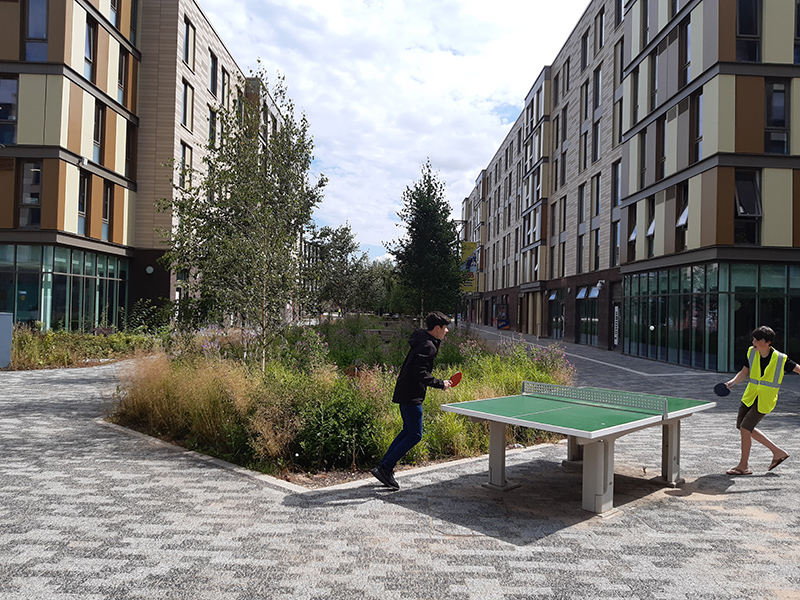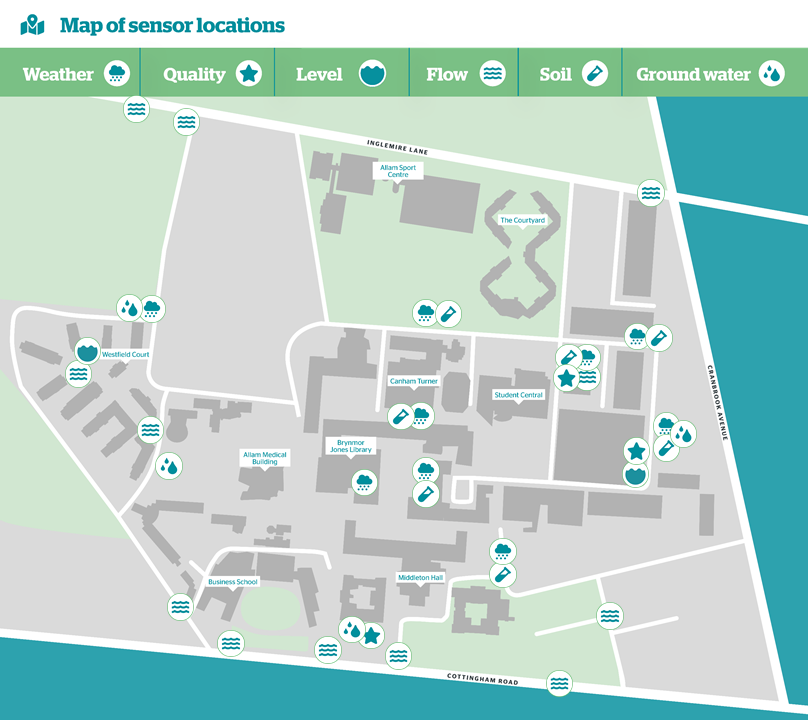SUDSLAB UK
Led by:
When approaches to urban drainage design incorporate natural water management practices to deal with excess surface water while assimilating water quality, biodiversity and amenity features, this is referred to as Sustainable Drainage Systems or SuDS. The University of Hull has a wide variety of SuDS infrastructure on its main campus.
The challenge
PROJECT PARTNERS

![]()


EVALUATING THE IMPACT OF SUSTAINABLE DRAINAGE
Most days we give little thought to water in our urban environments. Yet only by managing surface water effectively can we avoid the devastation of widespread flooding when drainage systems are overwhelmed by heavy rainfall. In this way, SuDS have a vital role to play in helping society adapt to the consequences of climate change which is expected to bring more frequent heavy rainstorm events.
Our challenges are:
- to encourage awareness of how water can be managed sustainably in our towns and cities and
- to educate people about water management and sustainability,
- to understand better how sustainable drainage systems can be made more efficient at slowing and filtering surface water,
- to optimise SuDS for different rainfall conditions and maximise their benefit for the wider catchment,
- provide examples that demonstrate how citizens and developers can manage water sustainably.
Additionally, the team would like to grow a greater understanding of how communities engage with and benefit from sustainable drainage infrastructure. We will explore the wider benefits of these important installations in the community and how they are perceived.
The solution
PROJECT LEAD
Hiatt Jackson,
Technology Research Manager
PROJECT TEAM
Pip Betts,
Flood Innovation Centre
Dr Giles Davidson,
University of Hull
Dr Stuart McLelland,
University of Hull
Dr Rob Thomas,
University of Hull
A LIVING LAB FOR SUSTAINABLE DRAINAGE
In order to meet these challenges we are working with the University of Hull to adapt its campus into a living laboratory for sustainable drainage: SuDSlab UK.
The University of Hull’s attractive Cottingham Road campus includes several well-designed SuDS of different types. We are fitting sensors to these and to a range of new and innovative SuDS assets that are being installed. We are also deploying a sensor network at strategic locations right across the campus.
The sensor network will gather data outputs including from ultrasonic flowmeters, depth gauges, weather stations, soil moisture, conductivity and humidity sensors. Together, these will provide information about how individual SuDS are performing as well as creating a real time picture of the hydrological status of the whole campus.
A digital dashboard has been developed to interpret and share the novel dataset generated by the SuDSlab UK sensor network.
We will also incorporate citizen science capabilities into our interactive platform that will allow us to collect data for a broad range of social outputs.
In this way, the University campus will become a Living Lab for Sustainable Drainage.
The RESULT
A TOOL TO IMPROVE AWARENESS AND ENGAGEMENT WITH SUDS
“The SuDsLab project is demonstrating ways to create more space for accessible nature in our urban environments, whilst capturing meaningful evidence for decision makers to replicate these changes elsewhere.”
Matthew Millington
Local Nature Partnership Development Officer
East Riding of Yorkshire Council
SuDSlab UK will increase water sustainability on campus, improving flood and drought resilience and raise the profile of sustainable drainage and water in the urban environment. By establishing the University’s campus as a densely instrumented environment for water monitoring, it will also act as a pilot for wider initiatives. Further impact will arise through:
Research
SuDSlab UK will provide a unique research tool for academic study of sustainable drainage to increase our understanding of how sustainable drainage components interact to influence the overall hydrological performance of a small catchment as well as allowing us to examine in detail the effect of soil substrates in water attenuation.
SuDSlab UK will also create opportunities for research into the social impacts of creating blue green infrastructure, giving insight into the benefits of natural flood management on the well-being of those who live, study and work nearby.
Innovation and Demonstration
Data will be shared openly from SuDSlab UK to help and encourage others to innovate new and better sustainable drainage solutions. The team also plan to develop more testbed facilities where novel formats and substrates can be evaluated and compared, bringing sustainable drainage research into reality.
The Flood Innovation Centre continuously engages with developers, construction companies and stakeholders to inform future projects. This will enable us to mitigate the impacts of new developments on flood risk by designing sustainable drainage into new developments.
Education and Awareness
SuDSlab UK will support a wide range of undergraduate and postgraduate education provision, including the University of Hull’s MSc in Flood Risk Management, as well as the potential for incorporation as a learning tool in professional short courses for specialists.
There will also be opportunities to bring sustainable drainage to life for the community more widely – through a wide range of University and stakeholder projects.


